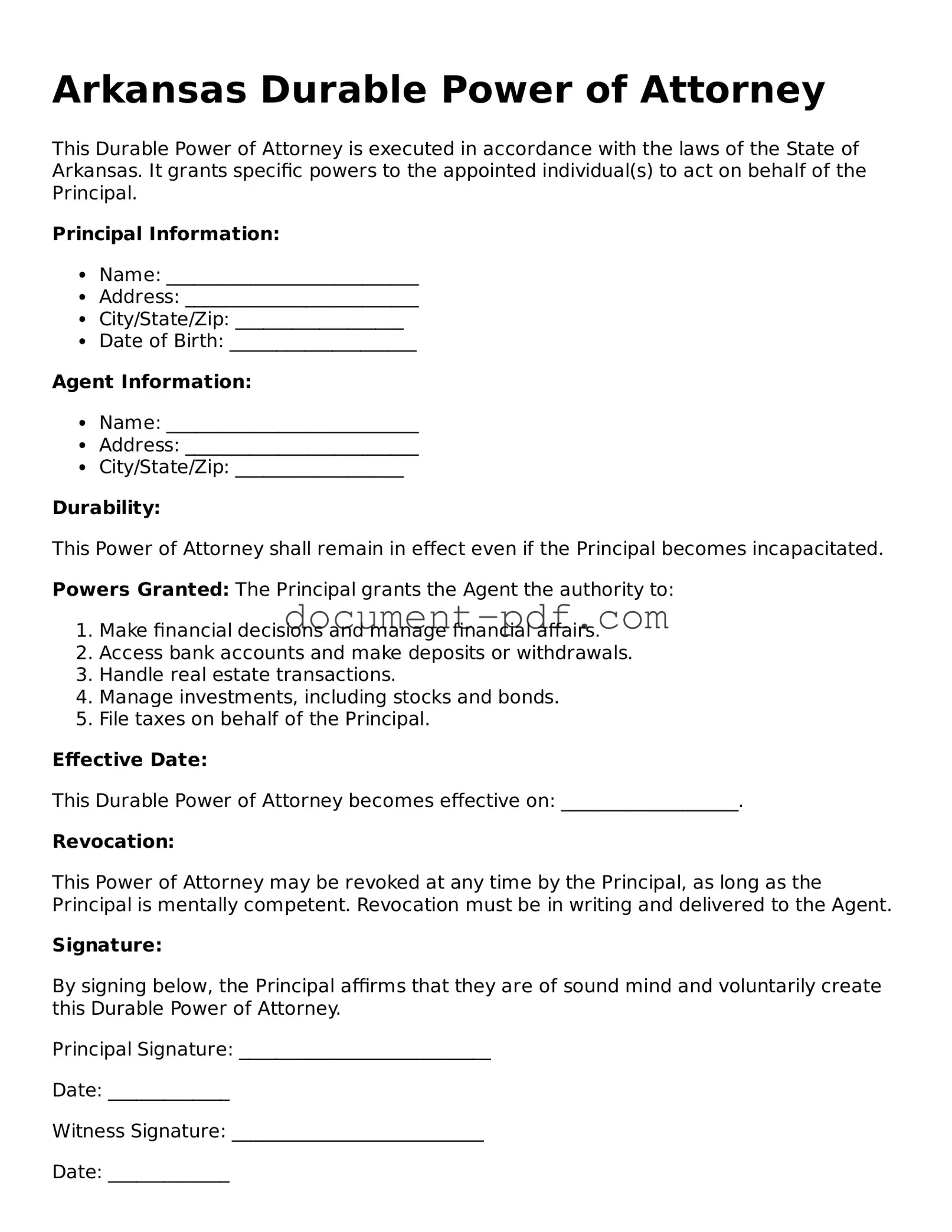The Arkansas Durable Power of Attorney form is similar to the General Power of Attorney. Both documents allow one person to act on behalf of another in financial or legal matters. However, the General Power of Attorney typically becomes invalid if the principal becomes incapacitated, while the Durable Power of Attorney remains effective even in such situations. This feature makes the Durable Power of Attorney particularly useful for long-term planning.
The Durable Power of Attorney is a critical legal tool that not only allows individuals to appoint someone to manage their affairs but also remains in effect during incapacitation. For those in Texas looking for a reliable way to create this important document, resources like Texas PDF Templates can provide valuable assistance in ensuring all requirements are met and preferences are clearly articulated.
Another document that shares similarities is the Medical Power of Attorney. This form specifically grants someone the authority to make healthcare decisions for another person. While the Durable Power of Attorney can include financial and legal decisions, the Medical Power of Attorney focuses solely on health-related matters. Both documents emphasize the importance of appointing a trusted individual to act on one’s behalf.
The Living Will is another related document. While the Durable Power of Attorney allows for a range of decisions, the Living Will specifically outlines an individual's wishes regarding medical treatment in the event they are unable to communicate those wishes themselves. Both documents serve to protect an individual’s preferences and ensure that their needs are met when they cannot advocate for themselves.
The Revocable Trust is also similar in that it allows for the management of assets. A Revocable Trust can be altered or revoked by the creator at any time, while a Durable Power of Attorney is effective until revoked or the principal passes away. Both documents can help in estate planning and ensure that one’s wishes are carried out, but they serve different purposes and have different levels of flexibility.
The Healthcare Proxy is akin to the Medical Power of Attorney. It designates someone to make healthcare decisions if the individual is incapacitated. Like the Durable Power of Attorney, the Healthcare Proxy is a proactive measure to ensure that a person’s preferences are respected. Both documents underscore the importance of appointing a trusted representative to make decisions when one cannot.
The Guardianship document is another similar option. While the Durable Power of Attorney allows someone to make decisions on behalf of another, a Guardianship is a legal relationship established by a court. Guardianship is often necessary when an individual is deemed incapable of managing their affairs. Both documents aim to protect individuals, but Guardianship involves more legal oversight.
The Advance Directive is closely related as well. This document combines elements of both the Living Will and the Medical Power of Attorney. It outlines an individual's healthcare preferences and appoints someone to make decisions if they are unable to do so. The Durable Power of Attorney primarily focuses on financial matters, while the Advance Directive centers on health care, yet both are vital for comprehensive planning.
Lastly, the Financial Power of Attorney is a specific type of Durable Power of Attorney. It grants authority to manage financial matters, including banking and property transactions. While the Durable Power of Attorney can encompass various aspects of decision-making, the Financial Power of Attorney is focused solely on financial issues. Both documents empower individuals to ensure their affairs are managed according to their wishes.

